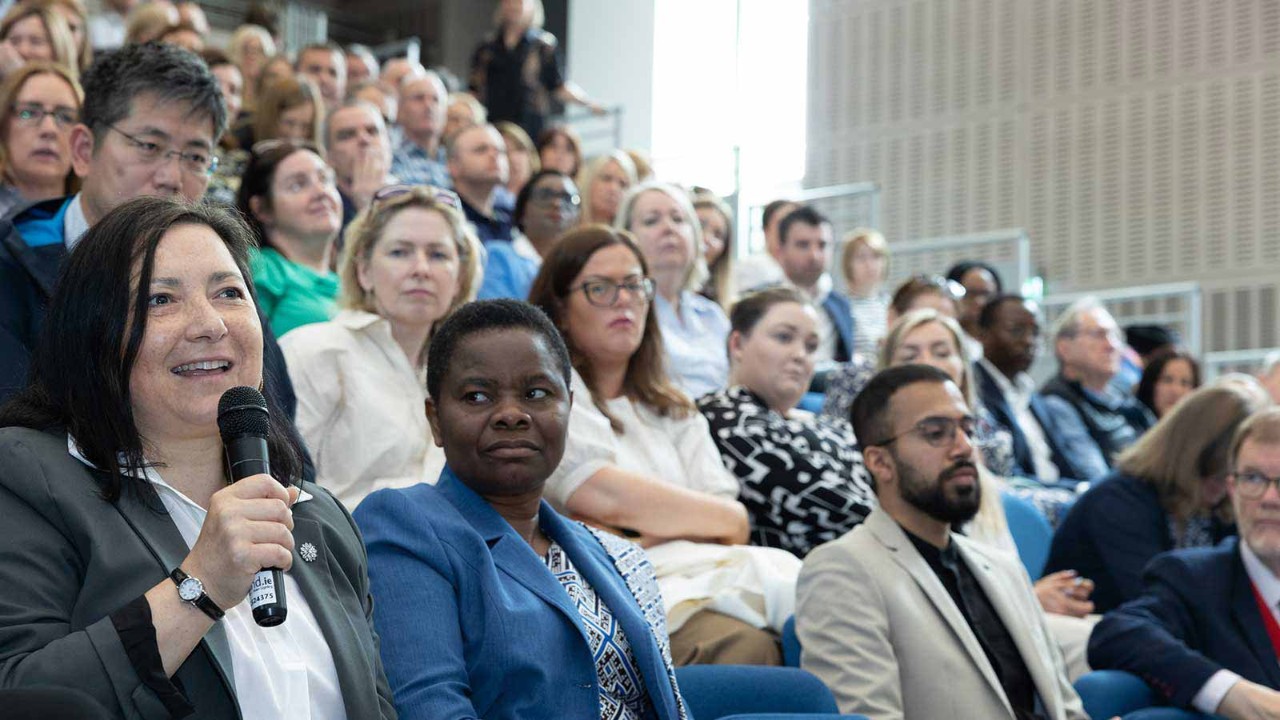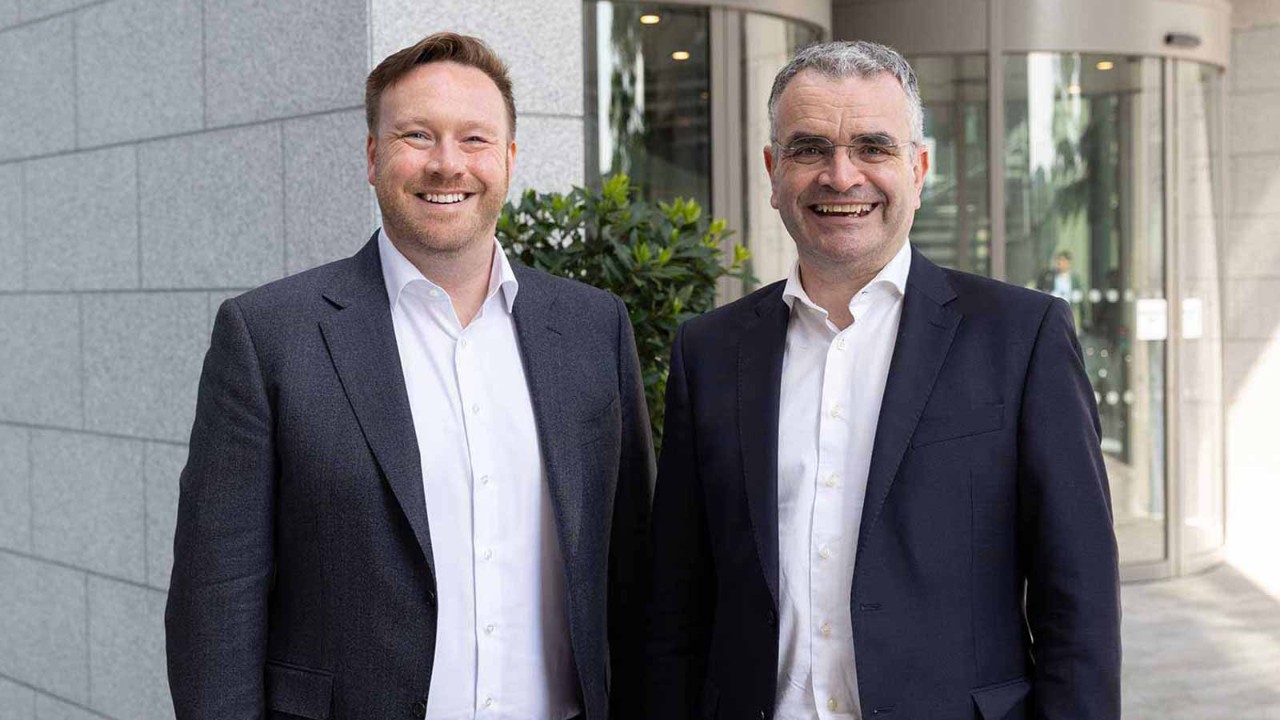
With a strong line-up of speakers and a state-of-the-art venue, the ACCA Ireland Conference 2023 proved a memorable opportunity to reflect on the dynamics shaping the accounting profession.
Attracting more than 200 ACCA members to the Trinity College Business School in Dublin on 1 June, the conference – which was sponsored by Circit, The Panel, AML HQ, Bright and iplicit – was the largest in-person ACCA Ireland event held in over three years.
Opening proceedings, ACCA Ireland chair Stephen Doyle FCCA expressed his hope that the day would ‘serve as a platform for exchanging ideas, discussing new developments and strengthening the relationships that are essential to building a vibrant ACCA community’.
The ACCA community was also to the fore in the welcome address from ACCA’s deputy president, Ronnie Patton FCCA. He shared his view of the ‘three Ps’ that drive the accountancy organisation forward: purpose, people and professionalism.
On the potential threat that technology posed to the future of accounting, Patton argued that the reverse was the case and that technology could ‘liberate accountants to carry out work of higher value, with strategic importance, to serve employers and clients in a much broader sense’.
Auditors’ obligations
The input of the profession was also under consideration as Ian Drennan FCCA, CEO of the Corporate Enforcement Authority (CEA), took the audience through the workings of this recently established organisation.
AI offers enhanced data analysis, real-time financial reporting and predictive analysis
Outlining the statutory functions of the CEA, which include the investigation and enforcement of civil and criminal breaches of company law, he stressed the obligation for a robust evidence base in auditor reporting. ‘In addition to being required to report in instances where they have formed the requisite opinion, auditors are also required to provide the particulars of the grounds on which they have formed such opinion,’ he said.
The rise of AI has fuelled a frenzy of opinion-making and Mary Coghlan, data and analytics partner at EY, offered the conference some insights into what this seismic technological advance might actually mean for accountants. While the potential to automate routine tasks is well understood, she pointed to other potential dividends, such as enhanced data analysis, real-time financial reporting and predictive analysis.
Coghlan recommended that accountants directly engage with the technology to better understand how it can assist them, suggesting its use to ‘quickly grasp new concepts, stay updated on industry trends, or acquire knowledge in a time-efficient manner’.

Restructuring support
Accounting challenges of a more traditional kind were to the fore as Ian Barrett FCCA, managing director, restructuring, KPMG, addressed the topic of directors’ duties and obligations in businesses in financial distress.
Barrett set out four areas where particular attention is needed by directors: keeping accurate books and records; continuous financial planning and monitoring; strong governance; and professional advice. He also stressed the legal implications for directors not fulfilling their statutory duties and obligations.
Meanwhile, Paul Murphy FCCA, principal at Martin J. Kelly & Co, addressed the subject of tax planning for the PAYE worker and highlighted the most common tax credits not claimed by workers. Among them are the home carer tax credit and the single person child carer credit.
He reminded his audience of the limits to what can be recovered if a tax credit goes unused. ‘Revenue will not refund any overpaid tax from more than four years ago,’ he said, adding this ‘very strictly enforced’ rule is matched by a similar approach for PRSI overpayments.
‘Know your customer’ also means ‘know your customer’s business’
Red flags
Those intent on bypassing Revenue entirely were the subject of a presentation by Tadhg Twomey, forensic accountant, An Gardai, whose anti-money laundering (AML) insights included the particular red flags accountants should look out for in different industries.
His overall advice was that ‘know your customer’ also means ‘know your customer’s business’. ‘Understand what is normal for that industry. Criminal enterprises don’t conduct business normally. It will stand out,’ he said.
Understanding forthcoming changes to FRS 102 was the focus of a presentation by Fiona MacNamara FCCA, registered auditor at Holohan MacNamara. She highlighted a number of proposed amendments to the accounting standard for Ireland and the UK, including changes to lease accounting and revenue recognition. MacNamara also outlined some frequent issues accountants experience in applying FRS102, such as accounting for deferred taxation during uncertain times.
There were additional presentations from Circit’s Nicola Peoples, commercial director, and Roisin Nash, customer success manager, who explained how new technology was allowing auditors, accountants, banks and legal firms to collaborate to verify assets and liabilities faster than ever before.
‘Business will need the accounting and audit profession to provide leadership and guidance’
Meanwhile, Clive Webb, ACCA’s senior subject manager, presented ACCA research on global talent trends for 2023. Key among these were the impact of the inflation crisis, the continued evolution of hybrid working and an increase in mental health pressures being experienced across the profession.
Clear role for the future
The day concluded with an address by Dara Calleary TD, minister of state at the Department of Enterprise, Trade and Employment.
Praising the role of the profession in what he said was ‘this government’s goal of not just creating but maintaining high standards of regulation’, he took the opportunity to preview some of the changes to be expected in the forthcoming Companies Bill 2023.
Among them is an easing of the audit exemption regime, meaning small or micro businesses that are late in filing their annual return will incur a late filing fee rather than automatically losing their audit exemption. He also spoke of a clear role for accountants in addressing climate change and noted that the government was committed to putting ‘sustainability reporting on a par with financial reporting’.
Calleary concluded with a message that will have resonated among many throughout the day, that, in the face of increasingly complex global challenges: ‘Business will need the accounting and audit profession to provide leadership and guidance.’
More information
Take a look at ACCA’s list of CPD activities
Find out about future ACCA Ireland events




